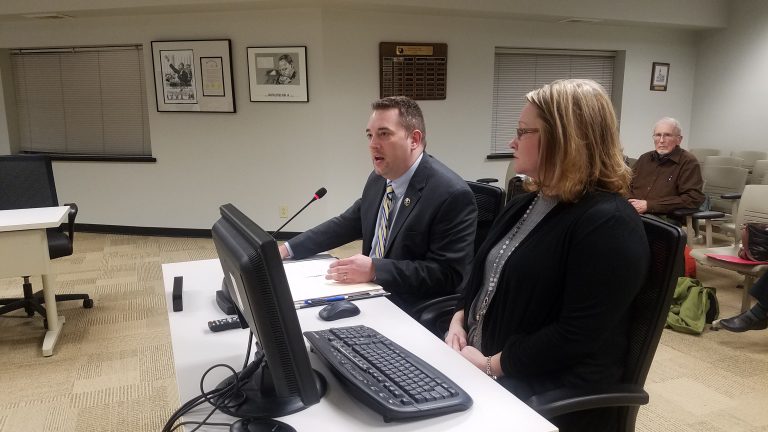CHAMPAIGN — The Champaign County Sheriff has selected a new company to offer phone and video calls at the Champaign County Jail.
The new company — Consolidated Telecom, Inc. — will offer two free phone calls to each resident per day. The new contract is set to begin on Feb. 15, 2024, according to the Request for Proposal.
Local activists fought for the last several months to convince the county to contract with a company that could offer free phone calls from inside the jail. Champaign County Board member Samantha Carter said people who are in jail and their families should not have to pay exorbitant prices to keep in touch.
“So often, I think people don’t see the struggles with family members of incarcerated loved ones,” Carter said. “This is going to really help alleviate some headache that is caused to that family with that loved one being incarcerated.”
Since 2018, the Champaign County jail has had a contract with Securus Technologies, a national company that provides communication technology in jails and prisons. The contract with Securus, initially slated to expire after three years, continues today.
Consolidated Telecom, Inc. has operated in Washington, Oregon, Ohio, Nebraska, Michigan, Idaho, Georgia, Texas, Montana, Illinois, Arizona and Utah, according to 2021 data from the Prison Policy Initiative.
At the Champaign County Board meeting Tuesday night, Sheriff Dustin Heuerman said Consolidated Telecom fulfilled everything he was looking for.
That included, he said, at least two free phone calls per person per day from the jail. The company offered to cover the calls at no cost to the county or the person making the call.
“I was very surprised that a company would do that, but they did,” Heuerman said. “And they still managed to provide the same investigative safety and security features that we were looking for.”
Concerns over costs and collection of biometric data
Many residents cited concerns with the past contract with Securus over the high cost of phone calls and the way the company collected biometric data. This included collecting the voice prints, or unique data of a person’s voice, while people made calls in the jail.
When asked why the jail allows Securus to collect biometric data, Sheriff Heuerman said in an email in September that the jail uses voice print technology to verify the identity of people making calls from the jail using their assigned PIN.
“It also allows investigators who are investigating a crime to be alerted of the probability of the inmate using another inmate’s PIN (phone line),” Heuerman said. “For example, if the victim of a violation of Order of Protection calls the police saying an inmate called and violated the Order, an investigator can see what phone calls the inmate has made while incarcerated.”
Illinois Public Media and Invisible Institute has submitted numerous open records requests for documents or metadata pertaining to the use and collection of biometric data. The Sheriff’s Office has declined the requests, saying such documents do not exist or that the requests are ‘unduly burdensome’.
The Sheriff’s Office did not immediately respond to questions about whether the new company, Consolidated Telecom, will also collect and use biometric data.
Many activists with concerns about Securus may praise the move to a smaller company. But Wanda Bertram from the Prison Policy Initiative said although the new Champaign County Jail contract might be rid of Securus soon, it’s important to keep in mind that Securus often buys out its smaller competitors.
Champaign County resident Sandra Ahten said she’s excited about the free calls that will be offered by the new company, but she’s worried about how people will be charged $3 each time money is loaded onto an person’s account.
“What if you only have a debit card, you only have five bucks to your name,” Ahten said, “then it costs you $8 to give $5” to a person in jail.”
Ahten said she will continue to monitor to issue of surcharges being added to phone calls from the jail. But overall, this new move has inspired her to keep advocating for change.
“One thing that it does is give us hope that we can make a difference,” Ahten said.
Farrah Anderson is an investigative reporting fellow with the Invisible Institute and Illinois Public Media, and a journalism student at the University of Illinois. Follow her on Twitter @farrahsoa.







